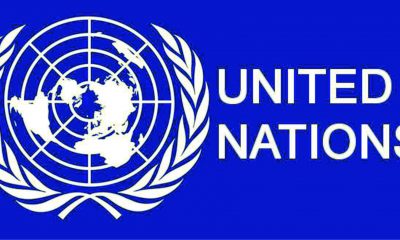Editorial
PIB: No To 3% Host Community Fund

For about one and half decades, Nigeria has been on a long-drawn-out trip on the Petroleum Industry Bill (PIB), with many assumptions and assurances failing overtime under past National Assembly leadership. However, two years into the Ninth Assembly, the Bill was passed upon adopting all the 318 clauses as put forward by the Committee on PIB following some modifications. With this latest outcome, it seems the Ninth Assembly is set to make history, if the PIB gets President Muhammadu Buhari’s acquiescence.
A presidential committee set up in 2007 to look into the oil and gas sector came up with the concept of the PIB, which intended to advance transparency at the Nigerian National Petroleum Corporation (NNPC) and the Nigeria’s share of oil fund. Later, the Bill was moved to the National Assembly in December, 2008 by the late President Umaru Yar’Adua.
However, the proposed legislation was never passed into law because of criticisms from the International Oil Companies (IOCs) and the NNPC over its compositions. In 2015, the former Minister of State for Petroleum Resources, Dr. Ibe Kachikwu, declared that the PIB was to be amended to facilitate its passage. It was later separated into distinct parts to focus on numerous aspects of the oil enterprise.
Despite the many unsuccessful attempts, the passage of the PIB was one of the preferences specified by the Ninth National Assembly in its legislative calendar. Members of the Senate and the House of Representatives, returning to work after their inauguration on June 11, 2019, pledged to break the ‘jinx’ around the Bill and reform the oil and gas sector.
President Buhari, on September 29, 2020, had passed on the PIB to the federal legislators. The Bill moved through the first and second reading without differing views from the lawmakers, and consequently, an ad-hoc committee was set up by the House for the public hearings, while the Senate Committees on Petroleum Upstream, Downstream and Gas, directed affairs for the Senate.
PIB seeks to get rid of the Petroleum Equalisation Fund (PEF) and Petroleum Products Pricing Regulatory Agency (PPPRA) and supplant them with a new agency to be known as Nigerian Midstream and Downstream Regulatory Authority (NMDRA), which will be responsible for the technical and commercial regulation of midstream and upstream petroleum operations in the industry.
Similarly, the Bill plans the establishment of Nigerian Upstream Regulatory Commission to be liable for the technical and commercial regulation of upstream petroleum activities. It further requests the commercialisation of the NNPC to develop into Nigerian National Petroleum Company to be incorporated under the Companies and Allied Matters Act by the Minister of Petroleum Resources.
The Federal Government had offered 2.5 per cent as royalty for the host communities in the proposed law. But, that was inadequate and consequently turned down by the host people who demanded 10%. But the Senate and the House of Representatives ceded only three and five per cent equity shareholding to the oil and gas producing communities.
While we laud the National Assembly for conducting the PIB through which had been in limbo all these years, we repudiate the preposterous 3% allotted to host communities and maintain that it be re-examined upwards for harmony, justice and equity. The minimum we demand is the 5% limit of the House with a periodic evaluation. The action of the Senate undermines the 65 years of oil discovery and exploration activities in the region and the resultant devastation of the environment.
Of similar concern in the PIB is the 30% share of profit reserved for exploration in the oil basins or frontier states. This is outrageous, fraudulent and provocative and should be expunged immediately. It is unreasonable to set aside that much for the exploration of a product that is shifting away with fading value.
Our stand on the ownership structure of the NNPC is consistent with that of the Southern Governors’ Forum. Although commercialising the Corporation will open it up for competition and make it more profitable, we think that its ownership should be in the trust of the Nigeria Sovereign Investment Authority (NSIA), not the Federal Ministry of Finance, since all tiers of government have interests in it.
It is getting clearer that the beneficiaries of the Nigeria’s flawed federal system are not rushing to shift ground. The governors should impress it on the lawmakers from the South to press home these demands. It is unpardonable to see the unjust laws and policies coming out of the Buhari regime with no serious pushback from Southern and Niger Delta legislators.
These National Assembly representatives, especially from the Niger Delta are disconcerting. How could they observe helplessly their counterparts from other parts of the country appropriate three and five per cent to host communities? Perhaps, they were slumbering and dozing when final considerations on the Bill were on. They have failed their people and are undeserving of a return.
The PIB must be revisited with the views of the host communities and stakeholders in the Niger Delta region considered. It is our opinion that the ongoing constitutional emendation should predate the review and ratification of the PIB, as most of the imbalance and marginalisation discovered in the passage of the Bill are predicated upon the deliberate malignancy in the 1999 Constitution.
Editorial
New Federal Varsity In Ogoni

President Bola Ahmed Tinubu has made history by signing into law a bill that establishes the Federal Univer-
sity of Environment and Technology in Ogoni, Rivers State. This significant occasion marks a bold step forward not only for the Ogoni people but also for the Niger Delta region and Nigeria as a whole. It signifies a commitment to education, environmental sustainability, and technological advancement.
For the Ogonis, who have long been impacted by environmental challenges, the university represents a beacon of hope. It is more than just bricks and mortar; it is a symbol of empowerment and a pathway to a brighter future. This development is akin to a seed, planted with the promise of a flourishing harvest of skilled professionals.
The university’s emphasis on environmental technology is extremely important, especially given Nigeria’s climate crisis. Education plays a crucial role in developing sustainable solutions. The institution will provide students with the necessary skills and knowledge to address the environmental challenges affecting the Niger Delta region and beyond. This will have a momentous impact.
Signing the bill, the President praised the Ogoni people’s resilience and unity. He stressed that the institution would mark a “significant milestone in our national journey towards environment justice, education and sustainable development”. Tinubu said the university is a reaffirmation of his administration’s “unwavering commitment to the people of Ogoni, the Niger Delta and the nation as a whole. For decades, the Ogoni people have been at the forefront of fight for environmental restoration and sustainable development, shaping both national and global conversation of these critical issues.
“By signing this bill into law, we are taking a decisive step towards addressing historical grievances and creating new opportunities for learning, growth and prosperity. The university will serve as a centre of excellence, equipping young Nigerians with the knowledge and skill to tackle present environmental challenges, drive clean energy solutions and contribute to our national sustainable economic development.”
We commend President Tinubu for his visionary decision to establish the much-needed institution aimed at fostering development and progress. This initiative is a testament to his commitment to addressing critical social and economic knots and creating opportunities that will benefit the people. The President has laid a solid foundation for sustainable growth while demonstrating a genuine desire to empower and advance the nation’s collective interests.
In addition to his commendable action, we applaud Tinubu for initiating peace talks to bring stability and reconciliation to the troubled area. The decision to engage in constructive dialogue demonstrates a deep understanding of the relevance of inclusive governance and the role of peace in fostering meaningful development. For decades, Ogoni has endured turmoil and neglect, impeding its potential and the return of oil exploration activities.
By opening the door to peaceful negotiations, the President has made a bold and necessary move towards healing fractured relationships and fostering trust among stakeholders. This initiative holds the promise of ensuring that the voices and needs of the Ogonis are heard and respected. We urge all parties involved to seize this golden opportunity for lasting peace and progress. It is only through unity and mutual respect that the full potential of Ogoni, and by extension the nation, can be realised.
As steps are taken to acknowledge and remediate the damage caused by years of oil exploration and production, the Ogonis must reciprocate Mr. President’s gesture by fostering a climate of equanimity and stability. This will ultimately pave the way for the resumption of oil exploration and production. This is not a call to forget the past, but a pragmatic recognition that meaningful change and sustainable development require a collaborative approach.
The Federal Government has a responsibility to ensure that all academic disciplines offered by the new university are fully accredited to maintain the integrity and quality of the school. Without proper accreditation, the institution risks producing graduates who are ill-equipped to compete in the global workforce or contribute substantially to national development. Accreditation serves as a benchmark that ensures programmes meet academic standards and adhere to best practices across various fields of study.
Staff recruitment should be conducted carefully, as the individuals brought into a team can greatly influence an organisation’s performance, culture, and long-term success. The primary focus of recruitment efforts at the university should be on attracting the best candidates who possess the necessary skills, qualifications, experience, and values. Merit should be the guiding principle in decision-making throughout the hiring process, rather than favouritism or personal bias.
For a nation to thrive in the 21st century, a strong higher education system is not only desirable, but essential. Universities serve as the catalysts for innovation, the breeding grounds for future leaders, and the foundations of a knowledge-based economy. The Federal Government must acknowledge this vital role and take intentional actions to properly fund the university in Ogoni and develop infrastructure to ensure it meets international standards. Neglecting this responsibility would put its future prosperity and global competitiveness at risk.
This institution must not suffer the same fate as other federally-owned universities that have been left to decay. That will be a disservice to its purpose and potential. Many government-owned universities in the country have struggled with dilapidated infrastructure, underfunding, insufficient staffing, and interruptions caused by industrial actions due to unpaid wages or poor working conditions. These challenges have led to declining standards in education, putting both students and staff at a disadvantage. The Ogoni University must not be another victim of this worrying trend.
Editorial
HIV, Transiting From Donor Dependence

The initial announcement by United States President, Donald Trump, to cut funding for international
HIV/AIDS initiatives sent shockwaves through the global health community. In Nigeria, a country facing a significant HIV/AIDS burden, the potential consequences were dire. However, the subsequent waiver granted by the administration has provided a lifeline for the millions of Nigerians who rely on the President’s Emergency Plan for AIDS Relief (PEPFAR) for their treatment and support.
PEPFAR has been an important partner in Nigeria’s fight against HIV/AIDS. Since its inception in 2003, PEPFAR has committed more than $7.8 billion to the country, catering to approximately 90 per cent of HIV treatment requirements. With this funding, Nigeria has been able to enhance its HIV prevention, treatment and support services and has witnessed a reduction in HIV/AIDS deaths.
The waiver granted by the Trump administration guarantees that PEPFAR’s life-saving medicines and medical services will continue to reach the needy. Antiretrovirals (ARVs) are the most common type of medicine used to treat HIV and reduce the virus’ spread. Through the provision of ARVs, PEPFAR helps prevent the spread of HIV and enhances the quality of life of those with the condition.
Although Nigeria was recently exempted from the requirement, the signs are evident: the country has to graduate from dependence on donor funds for its HIV/AIDS control programmes. Over the years, partners including the U.S. government have been central to the provision of treatment to people living with the virus. However, it is time for Nigeria to own its national response to HIV/AIDS.
Nigeria’s HIV/AIDS burden remains critical, accounting for 10 per cent of the global total. In 2023 alone, there were 75,000 new infections and 45,000 HIV-related deaths. The battle against Mother-to-Child Transmission remains challenging, with only 35 per cent of the target 75 per cent being met. Nearly 1.7 million Nigerian children have been orphaned due to HIV. Vulnerable populations, especially women and children, continue to disproportionately suffer.
To transition away from donor dependence, a multifaceted approach is necessary. Firstly, the country must increase its domestic financing for HIV/AIDS programmes. This can be accomplished through innovative funding mechanisms, such as leveraging public-private partnerships and exploring local revenue sources. Secondly, the government needs to strengthen its healthcare system to ensure equitable access to testing, treatment, and care. This involves expanding access to antiretroviral drugs, investing in community-based models, and addressing the stigma associated with HIV.
Thirdly, Nigeria must prioritise prevention efforts. This entails promoting condom use, providing comprehensive sexual education, and increasing awareness about the risks and modes of transmission. By focusing on prevention, the country can decrease the incidence of HIV infections and ultimately lessen the burden on its healthcare system.
Finally, Nigeria should develop a sustainable human resource strategy for its HIV/AIDS response. This involves training and equipping healthcare workers, engaging community volunteers, and empowering people living with HIV to advocate for their rights. A well-trained workforce is essential for delivering high-quality services and ensuring the long-term success of the response.
The transition beyond donor dependence is a complex but necessary journey for the country. By increasing domestic financing, strengthening healthcare systems, prioritising prevention, and investing in its human resources, the country can create a sustainable and effective response to HIV/AIDS. Also, the government should consider alternative funding mechanisms, such as increased domestic funding, public-private partnerships, and philanthropic initiatives. The time to act is now, for the well-being of present and future generations.
Nigeria’s National Agency for the Control of AIDS (NACA) has made momentous strides in combating HIV/AIDS, including expanding access to testing, treatment, and education. However, challenges persist, hindering the effectiveness of these efforts.
One major obstacle is limited access to healthcare facilities, particularly in rural areas. This impedes timely diagnosis and treatment, reducing the likelihood of optimal outcomes for those living with HIV. Additionally, stigma surrounding the disease remains a formidable barrier, preventing individuals from seeking testing and care. Inadequate awareness campaigns further contribute to low testing rates and delayed diagnosis.
Addressing these challenges requires concerted action by the government and stakeholders. Allocation of adequate funding is crucial to expand healthcare infrastructure and ensure the availability of essential services. Moreover, targeted interventions to reduce stigma and promote awareness are vital for increasing testing and early detection.
Collaboration between civil society organisations and grassroots movements is also essential for advocating for protection of HIV funding. Advocacy campaigns can mobilise public support and pressure lawmakers to prioritise the fight against HIV/AIDS. By addressing these challenges and ensuring sustainable funding, Nigeria can depend less on donor countries, drastically reduce HIV transmission, and provide the necessary care to those affected by the disease.
Editorial
Israel-Gaza War: Sustaining The Ceasefire

-

 News5 days ago
News5 days agoWFP Votes $2.5bn To Fight Hunger, Malnutrition In Nigeria
-

 Editorial5 days ago
Editorial5 days agoHIV, Transiting From Donor Dependence
-

 Politics2 days ago
Politics2 days agoPDP Stalwart Canvases Support For PHALGA Mayor
-
Education2 days ago
LG Boss Inaugurates 11-Man Scholarship Board
-
News5 days ago
Old Boys Plan Rehabilitation Of GSS, Okehi
-

 Sports2 days ago
Sports2 days agoDikko Pledges Support For NDF
-

 News2 days ago
News2 days agoTinubu Hails Fayemi’s Contributions To Democracy On 60th Birthday
-

 Niger Delta2 days ago
Niger Delta2 days agoUkpai, Others Predict Better Future For D’Gov’s Home Town

